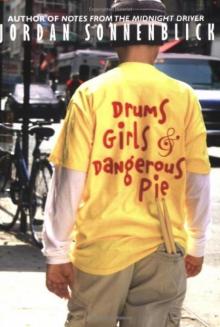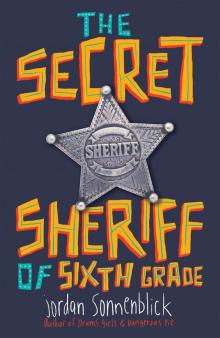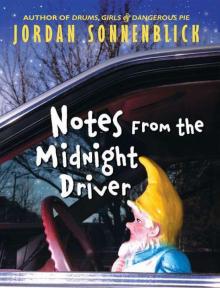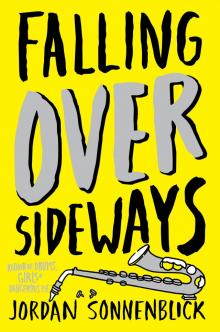- Home
- Jordan Sonnenblick
Notes From the Midnight Driver Page 5
Notes From the Midnight Driver Read online
Page 5
“Slower,” Sol muttered. So I slowed down. I looked up about halfway through the chart, and his eyes were closed. His face looked almost peaceful, and his breathing was the quietest it had ever been in my presence. I figured I was either impressing him or putting him in a coma. For the last chorus, I played harder and more rhythmically, and Sol’s fingers started rubbing together in the ghost of a snap. So he was dialed into what I was playing, which was both cool and scary.
When I stopped, and the last dominant-seventh chord was still floating in the air like a bell you might have once heard in a sad dream, Sol opened his eyes and looked at me. I couldn’t read anything in his expression at all. Did he like the song? Did he think I’d played well? Was he really not going to criticize?
“More,” he whispered hoarsely. “More.”
I couldn’t believe it. I had found something I could do that Solomon Lewis liked.
And, try as I might, I couldn’t see a “Gotcha” angle anywhere.
November 22
Dear Judge Trent,
I am writing today with my first piece of positive news. As you may remember from my hearing, I play the guitar, and am a member of my high school’s jazz band. This week, Mr. Lewis asked me to play my guitar for him, and I did. The playing seemed to entertain him. As I was leaving for the day, Mr. Lewis even told me, “If you ever want to practice more for somebody old and defenseless, feel free. I’m stuck here in bed anyway.” Which is the kindest thing he has said to me yet.
I don’t know how this will allow me to learn a lesson or teach one, but at least while I’m playing the guitar, Mr. Lewis is not mocking me, swindling me, or spilling icy beverages on my innocent flesh.
Thank you for your faith in me.
Sincerely,
Alex Gregory
HALF AN ANSWER
In December, there was a serious cold snap. My mom finally un-grounded me so I could go shopping for her Christmas presents, but I spent tons of time in my basement practicing my jazz tunes for Sol. I even bought a tiny amplifier the size of a Walkman so I could play a little louder during my visits, even though the extra $30.00 added six hours to my sentence at the home. And twice a week, I dragged my Tele and the mini-amp onto the bus and up to Sol’s room.
One day, I had just walked in when Sol asked me, “Where’s your little wife, Laurie?”
“We’re friends, Sol.”
“About this, my grandmother had a saying: ‘A halber entfer zogt oiget epes.’ That means, ‘Half an answer also says something!’”
“Whatever. Do you want to hear something new I’ve been working on, just for you?”
“Oh, just for me, heh? Not for your tremendous worldwide audience, then?”
“Ha-ha. Do you want to hear it or not?”
“Who says I don’t want to hear it? I’m sitting here, aren’t I? You’re a very sensitive boy, Alex. You have to toughen up, or the world will be a hard place for you.”
“I’m not sensitive, Sol. You have no idea how strong I am.”
“Oh, and you have an idea how strong you are? How do you know, with the easy life you kids are having nowadays? Strong, schmong!”
“Anyway, Sol, I’m going to play now.” And I played a piece I had dug out of the jazz-band folder at school. I wanted to do something that Sol would know was just for him, so I found the medley from this play called Fiddler on the Roof. It’s about a Jewish guy in the old country somewhere whose daughter wants to marry a guy who’s not Jewish. I figured he would like to hear something a little different, and maybe he could relate to it or something. I had worked really hard on the piece, because the school’s music was only for the piano, and it’s hard to rewrite piano music for the guitar. Actually, it was probably the most effort I had put into anything since before my dad had moved out.
The medley starts out with this funny song called “Tradition.” It’s a big “oompah-oompah” kind of thing, and pretty fast. Then it segues into “Matchmaker, Matchmaker,” which is the easiest part—a fast waltz with a simple melody. Next comes another “oompah” part called “To Life,” which is the translation of a Jewish toast, L’Chaim. I was pretty proud that I knew that—Sol always said it right before he swallowed his pills. Anyway, the part after that is called “Sunrise, Sunset.” It’s a song the father sings about how he can’t believe his daughter is old enough to move out and get married. It’s a bittersweet kind of waltz and was really pretty when I didn’t mess up the big finger stretches I had to pull off in order to play through its chord changes. Which was about forty percent of the time, but hey—I was tryin’.
So I started playing. You know how in, like, a Disney movie or something, the princess will start singing and all the birds and bees and deer and stuff will gather around to listen? This was a lot like that, but the birds, bees, and deer had walkers, wigs, and hearing aids. Residents came in. Nurses came in. Mrs. Goldfarb almost came in, but couldn’t quite get herself to enter Sol’s room, so she was just sort of leaning on the door frame.
“Tradition” flew by under my fingers. “Matchmaker, Matchmaker” might have been a tad slow, but when I looked over at Sol, he was nodding in time like he was conducting me with his fearsome eyebrow. “To Life” was great—I had the little Gypsy-sounding rhythm part really snapping along. And then I started to ease my way into “Sunrise, Sunset.”
But as soon as I played maybe the fourth note of the first line (“Is this the little girl I carried?”), I chanced to look at Sol again, and what I saw made my fingers trip and crash all into one another, like the Three Stooges had suddenly taken possession of my digits. His head was bowed to his chest, and it looked as though he was crying silently. I stumbled through the rest of the song, and all of the assembled oldsters clapped, but by the end all I wanted was to find out what was wrong with Sol. As soon as the others started walking out, I turned to the bed.
“Sol, are you all right?”
No response.
“Sol? Mr. Lewis?”
He ignored me just long enough for the clacking of the last cane to fade off down the hallway, and then looked up. His eyes were still brimming and bloodshot. “I’m fine, Alex. What? A man can’t be moved by some music once in a while?”
“But I didn’t mean to make you upset. This was supposed to be, like, your Hanukkah present.”
“Alex, Alex. I’m not upset. You gave me a very nice present. New socks, I don’t need. A sweater from the mall, I don’t want. Music, I like. And you played all right today.”
“I did?”
“Don’t fish for a compliment, boychik—it’s not dignified. I’m not saying you should quit your day job and head for Broadway, but you’re learning something.”
He watched without saying anything as I packed up my guitar, and I wondered why that one song would make him so emotional. I was feeling rather brave, since I had been such a big musical hit with him lately, so I asked. “Sol, was there something about that Sunrise song that bothered you?”
He smiled tightly, without showing a single tooth. “I didn’t so much enjoy the part where you lost the time and played all the wrong notes. Other than that, I’m fine.”
Right before he kicked me out of his room for the day, I told him a saying I’d just heard: “Half an answer also says something!”
HAPPY HOLIDAYS
Christmas break was looking grim. I planned to visit the old man every day of the vacation so I could really pack in the hours, but that wasn’t exactly a one-way ticket to Party Land. Plus, Laurie was in New York with her mom until just before New Year’s Eve, and my mom was working double shifts at the home so that “other people can enjoy time with their families.”
What was I, her dog? Her goldfish, maybe? A really, really under-qualified chauffeur?
Of course, my mom wasn’t my whole family. And the missing one-third of our little trio was sitting on Mom’s front step one day when I got back from a day at the home.
Dad looked tired and kind of old. I stopped about ten feet in front o
f him, wondering how long he’d been sitting there in the freezing weather, with nothing but a suit jacket to keep him warm and his expensive wing-tip shoes frosted in the drifting snow. He’s some kind of junior vice-president guy at the local bank, and is always dressed super-fancy, even hours after work. But for the first time I could ever remember, his face was completely covered in stubble.
“Hi, Alex.”
“Uh, hi, Dad.”
“It’s been a while. You know, I called a few times.”
“Yeah, I’ve been really busy with my community service, and school, and the SATs are coming up. I was going to call you, but—you know…”
“And I sent you some e-mails.”
“Yeah, my stupid mail server has been acting up.”
“Well, that would explain why you blocked all messages from my address, I suppose. What a relief. I thought you were mad at me.” Boy, between Mom’s sarcasm, and Dad’s, Laurie’s, and Sol’s, it’s a wonder I even stay sane. “Anyway, I just came by to see you before…before…well, I’m going out of town for a while.”
“What do you mean, out of town?”
“I’ve accepted a job in Philadelphia. It starts on January fifteenth.”
“But that’s like an hour and a half away. It’s in a whole ’nother state.”
“I know. That’s why it’s considered ‘out of town.’”
“Are you taking the home-wrecker with you?”
“You mean, Sandy?”
“Uh, yeah, Mrs. Simonsen, my third-grade teacher who made you break up with Mom.”
“She didn’t make—oh, whatever, Alex. Things aren’t as simple as they appear to you. No, she isn’t coming with me. We broke up a few weeks ago. That’s one of the things I was calling to tell you.”
“So why are you moving?”
“I need a change, Alex. I need to get away from all this.” He made a sweeping gesture that took in everything around, including his only son.
“Well, thanks for telling me. I guess leaving Mom and me wasn’t enough of a change, huh?”
“Look, Alex, I didn’t come here to fight, but you’re just wrong about this. I didn’t ‘leave’ your mother—she kicked me out. Like I said, things aren’t so simple. People are complicated and contrary.”
“Mom kicked you out? I don’t believe it.”
“Well, I don’t want to say anything bad about your mother, but she did.”
“Why?”
“That’s not important, Alex. What’s important is that I’m trying to be your father, and you aren’t letting me.”
“You’re trying to be my father by moving out of state? Wow, thanks for the show of support.”
“It’s not like that, Alex. Look—do you remember when Wink died?”
Wink was our cat when I was five. He ran out in front of a car because I had left the front door open and he’d gotten out. My parents had hidden the truth from me for weeks. “Yeah, are you trying to tell me he really just moved to Philadelphia?”
Dad nearly smiled, and he suddenly looked a lot like my old dad, my Little League-coaching, arm-wrestling-before-bed, taking-long-walks-to-see-the-turtles-in-the-park dad.“No, I’m saying sometimes parents try to shield their kids from hard facts. Maybe one day, Mom will be willing to tell you why she told me to leave. But that’s between you and her.”
Mom’s car turned the corner at the head of our block, and my dad jumped up from the snowy stoop. “Gotta go, kid. Are we friends?”
“I don’t know, Dad. I’ll call you. Does your phone still work?”
“My cell does.”
He struggled a bit with his frozen hands and his ice-cold car keys, but still managed to get the door of his fast little midlife-crisis mobile open before Mom could pull up and start arguing. He ruffled my hair, which he hadn’t done since maybe sixth grade, hopped in the car, and zoomed off.
If he had told me the truth about the divorce, then he wasn’t the bad guy. So who was?
Mom walked over to me. “What was that about?”
“Philadelphia, Mom.”
“Philadelphia, the city?”
“No, Philadelphia, the cream cheese.”
Tough family.
The next time I went to Sol’s, it was three days after Christmas, and also the first night of Hanukkah. I hadn’t prepared another special song or anything, so I stopped and bought Sol a book about jazz history. He was sitting in his chair staring at a huge vase of white flowers on his nightstand. The vase had a blue-and-white bow around it. Sol had a transparent tube wrapped around his head and stuck right under his nose. The tube made a constant hissing noise, so he didn’t hear me until I was right in front of him. He looked groggy, and only gave me a little nod. Even that looked like a big effort.
What the heck? I decided he’d explain if he wanted to, and that I’d pretend everything was normal.
“Sol, how are you? Happy Hanukkah.”
He muttered, “Happy Hanukkah. Where’s—HOO-hah—your guitar?”
“I didn’t bring it today, but I got you a book about jazz. It’s called Monk, and it’s about this great, crazy piano player named Thelonious Monk. Have you ever heard of him?”
The next thing Sol said sounded a lot like, “I knew him.”
But of course it was hard to make out the exact words, and I didn’t want to make Sol talk more than he had to, so I just nodded. “Nice flowers. Who brought them?” It had never occurred to me that Sol might have other visitors.
“I did. Claudelle went…to the…store with me. On…her day off. For my…daughter…Judy. HOO-hah! She’s a hotshot lawyer. Very smart. Very…busy.”
“They’re beautiful. I’m sure she’ll love them.”
“Yeah. Heh. She…always liked…flowers. Her mother, too—always with the flowers. HOO-hah. ‘Sol, did you get me any flowers? Sol, let’s plant…a garden. Sol, those are GORGEOUS! A little past their—HOO-hah—prime, maybe, but—nice.’ ”
He took a few moments to catch his breath and let go of his memories, and I spoke over his gasps. “Are you comfortable? Can I get you anything?”
“Does this, to you, look so comfortable? HOO-hah!”
“Well, I mean…what happened?”
“Nothing. I was walking…in the store with…Claudelle. Such a heart, that girl has. Like gold. Anyway…I walked too far. So now…I need…a little breathing help. That’s all.”
“Can they do anything to make it better?”
“Well, they’re giving me…” He touched the tube around his face. “Oxygen. And breathing treatments. And some pills, I don’t know. HOO-hah.”
“Is it working?”
“If I’m not dead, it’s working. If I die, you’ll—HOO-hah—know it wasn’t maybe working so good.”
I had never asked him about his health before, but now seemed like as good a time as any. “They told me when I started here that you have emphysema. How long have you had it?”
“A million years. I don’t know…boychik. Too…long.”
“How did you get it?”
“It’s funny, Alex. You smoke a million, two million—HOO-hah—cigarettes, and they don’t…hurt you. But you take one…puff…of number two million and one—and all of a sudden you’re—HOO-HOO-hah—in the hospital. Do you smoke?”
“No.”
“Good. Don’t start, or I’ll have to get up and give you…a klop on the tuchis.”
He looked up at me, and his eyes were more tired than I’d ever thought eyes could be. “Lesson over. Class—HOO-hah—dismissed. Now get out of here and let…an old man…read in peace.”
I stopped at the nurses’ station, where Claudelle was talking with Leonora. “She never comes. We buy her them damn flowers every year, but she never comes. And now her daddy’s all wired up in there.”
“I heard the paramedics almost had to intubate him.”
“Forget that. They almost had to shock him, right in the middle of aisle five of Kmart. It was like he was the Blue Code Special. But he got his flowers fo
r Judy, the Big-Shot Lawyer.”
“A shame. He’s really almost a sweet man, sometimes.”
“You got it a little mixed up, Leo. Sometimes he’s sweet and sometimes he’s almost a man!”
They both laughed a little, and then their voices subsided as they turned their attention to me. Claudelle spoke. “How are you today, Alex?”
“Is he going to die?”
“Not today, child. Not today. He’s a tough old thing, don’t you worry. You’ll get in your hundred hours before this is all over.”
This made me mad. “That’s NOT why I asked.”
“I’m sorry, baby. I know that. Sol will be all right in a day or two, long as he doesn’t get the pneumonia again, like Mrs. Johnson last spring.”
“Who’s Mrs. Johnson? I don’t think I’ve seen her around.”
Both women just looked at me blankly, until I realized I wasn’t EVER going to see Mrs. Johnson around. I had to get out of there. I mumbled something about having to catch my bus, and headed for the elevator like I was getting off a sinking ship, at least for a couple of days. Not that I had been keeping count, no matter what Claudelle had said, but I still had forty-four hours left with Mr. Lewis.
December 27
Dear Judge Trent,
I am just checking in with my December update. It was a hard month, but I think I may have learned a lesson: You can’t just throw somebody out of your life when they displease you. Mr. Lewis has this daughter somewhere who’s a lawyer, and every year he buys her flowers for Hanukkah. He puts them on his nightstand, and then he waits and waits for the daughter to show up and get them. But she never does. Maybe he’s so grouchy because his daughter doesn’t love him. I’m getting used to his grumpiness, though. He threatened today to give me a klop on the tuchis, which I looked up and learned is a smack on the butt. However, he actually said it kind of affectionately.

 Curveball: The Year I Lost My Grip
Curveball: The Year I Lost My Grip Dodger for Sale
Dodger for Sale Are You Experienced?
Are You Experienced? Drums, Girls & Dangerous Pie
Drums, Girls & Dangerous Pie Dodger and Me
Dodger and Me The Secret Sheriff of Sixth Grade
The Secret Sheriff of Sixth Grade The Boy Who Failed Show and Tell
The Boy Who Failed Show and Tell Drums, Girls, and Dangerous Pie
Drums, Girls, and Dangerous Pie Dodger for President
Dodger for President Notes From the Midnight Driver
Notes From the Midnight Driver After Ever After
After Ever After Zen and the Art of Faking It
Zen and the Art of Faking It Falling Over Sideways
Falling Over Sideways